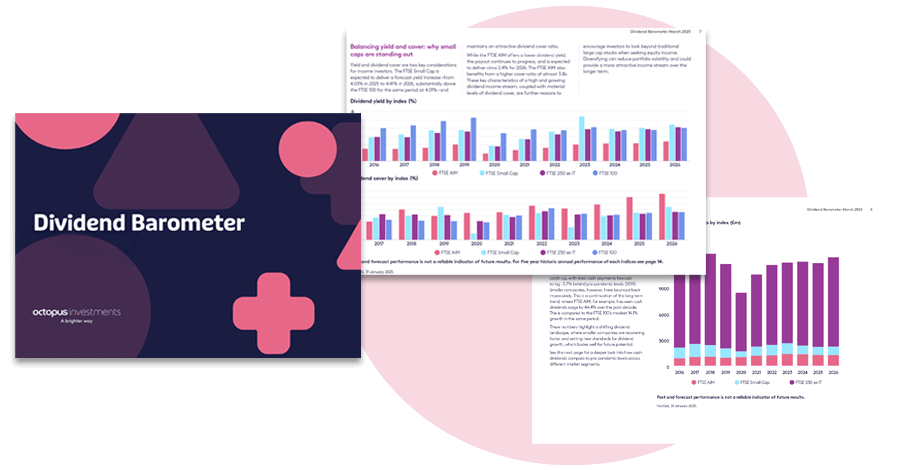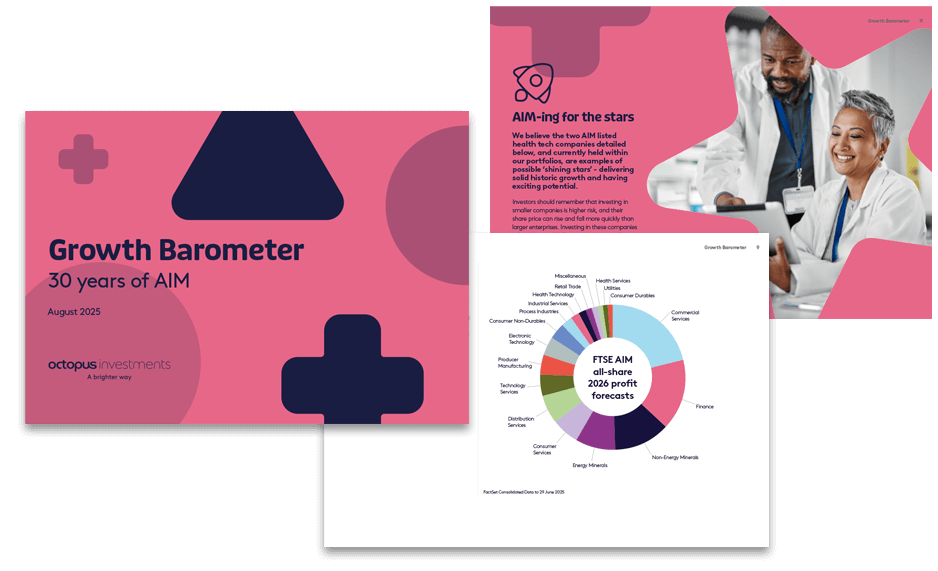Guide
Tax-efficient investments explained
Learn more about tax-efficient investing and how we can help.
What are tax-efficient investments?
What are tax-efficient investments?
Tax-efficient investments can help you plan for your financial goals, including retirement and passing more of your wealth to loved ones.
These investment opportunities allow you to claim certain tax benefits because you are investing into qualifying companies or investment vehicles.
However, because of their risk profile, the tax-efficient investments we offer aren’t suitable for everyone. We always recommend you seek financial advice before deciding to invest.
What are tax-efficient investments?
You’ll be familiar with pensions and ISAs. These let a client invest up to a certain amount while benefiting from tax relief. Investors can use their annual ISA allowance, for example, and expect to pay no tax on any growth or income.
The principles of the tax-efficient investments we specialise in are similar. They can help investors meet their financial goals, including passing more of their wealth to loved ones. However, because of their risk profile, they won’t be suitable for everyone.
Tax-efficient investments were created by the UK government to encourage certain behaviours from taxpayers providing tax relief. Specialist tax-efficient investments encourage investment into small businesses or innovative companies, to help grow the economy. Since the nature of these investments is high risk, investors can claim a range of tax reliefs as compensation.
A pension is a tax-efficient way to put money aside for later in life, to provide income for when you retire which the government acknowledges is an important thing they want tax payers to do.
ISAs are a tax efficient way to either save or invest tax efficiently and the government acknowledge the importance of this. Investors can use their annual ISA allowance to invest each year, and expect to pay no tax on any income or capital gains in their ISA.
The principles of specialist tax-efficient investments such as Venture Capital Trusts (VCTs), the Enterprise Investment Scheme (EIS), and Business Relief (BR)-qualifying investments are similar. They were created by the UK government to encourage investment into businesses that they feel can help drive and grow the economy. Since the nature of these investments are high risk, investors can claim a range of tax reliefs as compensation.
They can offer income tax relief on investment, in addition to capital gains reliefs and tax-free income, and can help investors pass more of their wealth onto loved ones with relief from inheritance tax. Some also provide investors with unique access to exciting early-stage companies. However, because they’re high risk, they aren’t suitable for everyone.
Tax-efficient investments were created by the UK government to encourage certain behaviours from taxpayers by providing tax relief. Specialist tax-efficient investments encourage investment into small businesses or innovative companies, to help grow the economy. Since the nature of these investments is high risk, investors can claim a range of tax reliefs as compensation.
You’ll be familiar with pensions and ISAs. These let a client invest up to a certain amount while benefiting from tax relief. Investors can use their annual ISA allowance, for example, and expect to pay no tax on any growth or income.
Specialist tax-efficient investments were created by the UK government to encourage investment into businesses that they feel can help drive and grow the economy. Since the nature of these investments are high risk, investors can claim a range of tax reliefs as compensation.
They can offer income tax relief on investment, in addition to capital gains reliefs and tax-free income, and can help clients pass more of their wealth onto loved ones with relief from inheritance tax. Some also provide clients with unique access to exciting early-stage companies. However, because they’re high risk, they aren’t suitable for everyone.
Investments for every life stage
Investments for every life stage
Along with an ISA or a pension, you might invest in a specialist tax-efficient investment at any point throughout your life, depending on your circumstances. But for the purposes of illustration, let’s look closer at what age you may start investing.

Many people tend to open an ISA soon after they begin working. You can even do this as a teenager.

It’s best to start investing in your pension as early as possible. Most people would start in their 20s when they begin full-time work.

When your career is more established you may be a high earner, perhaps you own a business or want to sell an additional property. You could now benefit from income tax relief, capital gains tax deferral or tax free growth. You can find this in tax efficient investments.

In your 70s and 80s you’re likely considering how you can leave as much of your wealth as possible to your loved ones. A BR-qualifying investment can provide a flexible solution for you.
We do not offer investment or tax advice, and we always recommend investors talk to a financial adviser before making investment decisions.
Investments for every life stage
Along with ISA’s and Pensions, a client might invest in a specialist tax-efficient investment at any point throughout their life, depending on their circumstances. But for the purposes of illustration, let’s look closer at what age your clients may start investing.

Many people tend to open an ISA soon after they begin working.

Most people would start investing in their pension in their 20s, when they begin full time work.

When a clients’ career is more established, they may now be high earners, perhaps they own a business, or want to sell an additional property. They could benefit from the income tax relief, capital gains tax deferral, or tax-free growth that’s offered with a specialist tax-efficient investment.

In their 70s and 80s, clients are likely considering how they can leave as much of their wealth as possible to loved ones. This is where a BR-qualifying investment can provide a flexible solution for certain clients.
Overview of specialist tax-efficient investments
An overview of specialist tax-efficient investments
Along with ISAs and Pensions, the following tax-efficient investments are available in the UK: VCTs, EIS, and BR. Each investment offers distinct benefits, suitable for varying needs and objectives.
What is Business Relief?
Business Relief (BR) is an established relief that allows certain investments to be left to loved ones free from inheritance tax. Compared to options like gifting, it can offer a faster solution to inheritance tax and doesn’t put capital permanently out of reach.
What are the reasons to invest?
Fast inheritance tax exemption
BR-qualifying investments can be free from inheritance tax after just two years.
Access and control
Investors retain access to their wealth and can request to sell their shares at any time.
Growth
BR-qualifying investments give investors the opportunity to grow their capital, with a range of products available to suit different appetites.
What are Venture Capital Trusts
Venture Capital Trusts invest in a diversified portfolio of early-stage companies. Investors benefit from the VCT owning small stakes in a large number of companies across different sectors.
What are the reasons to invest?
Income tax relief
Investors can claim upfront income tax relief equal to 30% of their investment up to the first £200,000 invested each tax year.
Tax-free dividends
The tax-free dividends paid by a VCT can create an additional income.
Diversification
VCTs give investors access to smaller companies they may not otherwise hold.
What is the Enterprise Investment Scheme?
Investors in an EIS portfolio own shares directly in a portfolio of early-stage companies. EIS typically appeals to experienced investors who want to back companies with high growth potential. Investors can claim generous tax reliefs because of the risks involved, which include loss relief when an underlying investment returns less than less than they invested.
What are the reasons to invest?
High growth potential
Access to high-risk opportunities with the potential for high growth.
Tax reliefs
Reliefs include upfront income tax relief, tax-free growth, loss relief, capital gains tax deferral, and inheritance tax relief.
Diversification
Access early-stage companies investors wouldn’t hold in a mainstream investment.
What is Business Relief?
Business Relief (BR) is an established relief that allows certain investments to be left to loved ones with relief from inheritance tax. Compared to options like gifting, it can offer a faster solution to inheritance tax and doesn’t put capital permanently out of reach.
What are the reasons to invest?
Fast inheritance tax exemption
BR-qualifying investments can provide relief from inheritance tax after just two years.
Access and control
Investors retain access to their wealth and can request to sell their shares at any time.
Growth
BR-qualifying investments give investors the opportunity to grow their capital, with a range of products available to suit different appetites.
What are Venture Capital Trusts?
Venture Capital Trusts invest in a diversified portfolio of early-stage companies. Investors benefit from the VCT owning small stakes in a large number of companies across different sectors.
What are the reasons to invest?
Income tax relief
Investors can claim upfront income tax relief equal to 30% of their investment up to the first £200,000 invested each tax year.
Tax-free dividends
The tax-free dividends paid by a VCT can create an additional income.
Diversification
VCTs give investors access to smaller companies they may not otherwise hold.
What is the Enterprise Investment Scheme?
Investors in an EIS portfolio own shares directly in a portfolio of early-stage companies. EIS typically appeals to experienced investors who want to back companies with high growth potential. Investors can claim generous tax reliefs because of the risks involved, which include loss relief when an underlying investment returns less than they invested.
What are the reasons to invest?
High growth potential
Access to high-risk opportunities with the potential for high growth.
Tax reliefs
Reliefs include upfront income tax relief, tax-free growth, loss relief, capital gains tax deferral, and inheritance tax relief.
Diversification
Access early-stage companies investors wouldn’t hold in a mainstream investment.
Which tax-efficient investment should I consider for my client?
Answer two questions about your client’s investment and tax objectives and we’ll suggest potential investments.
Clients who could benefit from tax-efficient investments
Tax-efficient investments could help a variety of clients. Watch or read our planning scenarios to help you recommend effective planning strategies.
Risks to remember
Risks to remember
- Remember that the value of an investment, and any income from it, can fall as well as rise. Investors may not get back the full amount they invest.
- Investment in EIS and unquoted companies are high risk. Investors must be prepared to lose all the money invested.
- VCT, smaller and unquoted company shares could fall or rise in value more than other shares listed on the main market of the London Stock Exchange. They may also be harder to sell.
- Tax reliefs depend on VCTs maintaining their qualifying status or portfolio companies maintaining their BR or EIS-qualifying status.
- Tax treatment depends on individual circumstances and could change in the future.
The explanation of all of the tax rules set out in this guide have been written in accordance with our understanding of the law and interpretation of it at the time of publication.
Risks to remember
Risks to remember
- Remember that the value of an investment, and any income from it, can fall as well as rise. Investors may not get back the full amount they invest.
- VCT, smaller and unquoted company shares could fall or rise in value more than other shares listed on the main market of the London Stock Exchange. They may also be harder to sell.
- Tax reliefs depend on VCTs maintaining their qualifying status or portfolio companies maintaining their BR or EIS-qualifying status.
- Tax treatment depends on individual circumstances and could change in the future.
The explanation of all of the tax rules set out in this guide have been written in accordance with our understanding of the law and interpretation of it at the time of publication.









